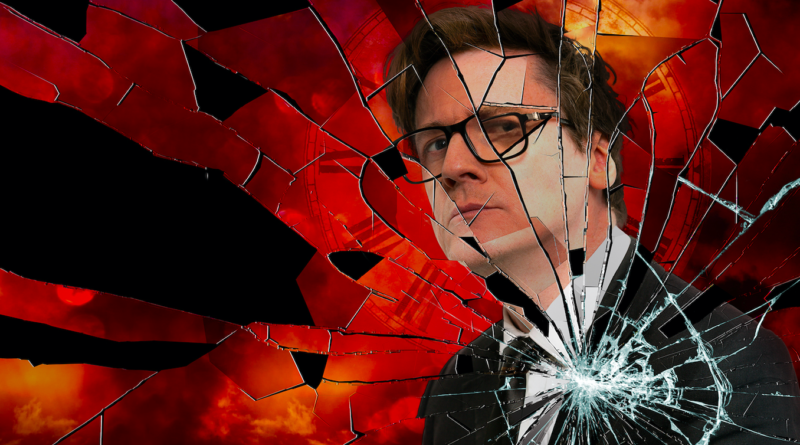INTERVIEW: In new show, Ed Byrne explores tragedy, from a comedian’s POV
Photo: Ed Byrne stars in Tragedy Plus Time, a one-person show about his brother, Paul. Photo courtesy of Roslyn Gaunt / Provided by DARR Publicity with permission.
In recent years, the off-Broadway theatrical scene has produced a number of shows that have explored the depths of grief and tragedy, but often by utilizing the disarming tools of humor. Now, direct from an acclaimed run at the Edinburgh Fringe, comes Ed Byrne’s poignant and observational one-person show, Tragedy Plus Time, which centers on the comedian’s relationship with his brother, Paul, who died last year at an early age.
The play receives its title from the famous line by Mark Twain: “Humor is tragedy plus time.” Within the work, Byrne offers a moving tribute to his brother, but he also offers a laugh-filled take on a variety of topics, including sibling rivalry and reconciliation.
Tragedy Plus Time continues through Sunday, Nov. 12, at Soho Playhouse in New York City. Byrne is a successful comedian and TV presenter, having appeared on everything from Late Night With Conan O’Brien to Live at the Apollo for the BBC. After the New York City engagement, Byrne has plans to bring the show to the UK, Ireland, Australia and New Zealand.
Recently Hollywood Soapbox exchanged emails with the comedian to learn more about the one-person show. Questions and answers have been slightly edited for style.
How did this particular solo show begin? When did you first put pen to paper?
About three months after my brother Paul passed, I did an interview with a podcast called Griefcast, which is all about grief. I remember saying then that it was inevitably going to eventually become standup material. The writing of the show didn’t begin properly until about December of last year, and even then, I wasn’t really sure how much of the show was going to be about my brother’s death. As it turns out, Paul’s death has formed the backbone of the entire show.
Is it difficult telling a deeply personal story about your brother and family?
It was particularly difficult when I first started performing the new material in comedy clubs. People had come out for a Friday or Saturday night’s entertainment and maybe weren’t entirely open to hearing somebody do 20 minutes about death. Then when I started doing full-length “Work in Progress” shows in little workshop rooms like The Museum of Comedy, I had the problem of reliving some fairly traumatic and depressing stuff on stage. Getting through those early shows without openly weeping in front of the audience was a bit of a challenge. At this point, however, I’m managing to keep those feelings in check.
What was it like to receive such raves in Edinburgh?
It was bittersweet. I kept saying, “I’m the toast of the Edinburgh Fringe, and all it cost me was one brother!” It feels positively Faustian. I wish I didn’t care what reviewers think, but I do. So it was nice to have that validation. Obviously, the most important thing is that the audience enjoys it, and the feedback from the people who took the time to wait around for me after the show was very strong. One couple who knew my brother said watching the show was like getting to spend another hour in his company. That’s probably the best review I could have hoped for.
Has the show changed as it transfers to off-Broadway in New York City?
Certainly. There are a few references to British/Irish pop culture and politics that will have to be dropped, but I’m looking forward to seeing what I end up replacing them with. It’s always exciting taking a new show abroad for the first time. Often the changes you make for an overseas audience end up improving the show overall.
What happens if there’s a night when you don’t want to tell this story, but you have a scheduled performance? Has that happened?
The first couple of nights at the Edinburgh Fringe Festival were very tough. Paul and I hung out together in Edinburgh quite a bit, and being at the festival without him made his absence all the more palpable. The more I performed the show, however, the easier it got, and now I quite look forward to sharing my memories of my little bro with the audience.
When did you find out you were funny?
I remember when I was at college and a friend of mine said a really funny thing to me, like he was quoting a sitcom or a standup, and I said, “That’s a really funny line. Where’s that from?” And he said, “You said it two nights ago. Don’t you remember?” And I just thought, I don’t remember saying that, but it’s pretty funny!
By John Soltes / Publisher / John@HollywoodSoapbox.com
Tragedy Plus Time, starring Ed Byrne, continues through Sunday, Nov. 12, at Soho Playhouse in New York City. Click here for more information and tickets.

